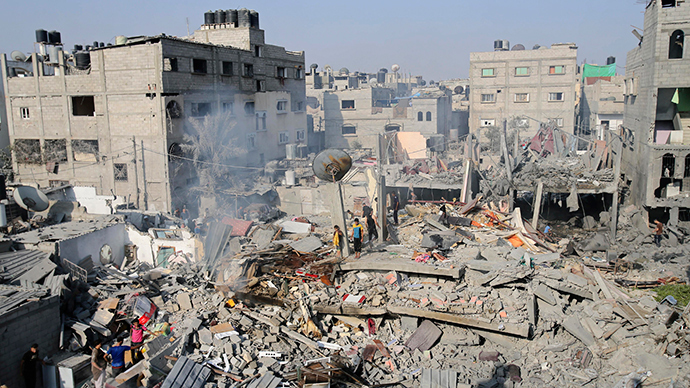‘Palestinians skeptical about promised financial aid’

Many Palestinians are skeptical about the $5.4 billion aid pledged for the rebuilding of the Gaza Strip, as they understand that conditions might be set for them to get the money, Hani al-Bassous from the Islamic University of Gaza told RT.
The donor conference in Cairo that took place last weekend garnered about $5.4 billion of assistance for Gaza, while the Palestinian Authority was asking for $4 billion dollars. The main contributors for the relief efforts turned out to be the US, the EU, and Germany, along with Turkey, Qatar and Kuwait.
International human rights lawyer Dr. Curtis Doebbler on pledged assistance to Gaza: “Qatar has always been supporting the people of Gaza and Palestinian people generally.”
Qatar became the biggest donor, pledging a billion dollars. "The state of Qatar announces its participation with an amount of $1 billion for the reconstruction of Gaza," Qatari Foreign Minister Khaled-al-Attiya said at the conference.
The US promised to give Palestine $212 million; the EU pledged $568 million, with a separate $64 million donation from Germany, whereas Turkey, Kuwait and UAE together donated $200 million.
Hani al-Bassous from the Islamic University of Gaza expressed skepticism over the financial pledges, saying that previously Gaza hadn't received anything.
International human rights lawyer Dr. Curtis Doebbler on pledged assistance to Gaza: “The US gives $130 billion per year to Israel; $3.1 billion is just military assistance. So this is really a pittance that is given to Palestine.”
“In 2009, after the war in the Gaza Strip by the Israeli side $6 billion was pledged to help the Palestinians in the Gaza Strip but we have seen nothing in Gaza, except some money that came from different places and donors,” he added.
Though the current situation differs a lot since there is a newly formed unity government in Palestine, which presupposes changes in Palestinian politics, al-Bassous believes that there could be some conditions for the Palestinians to get access to this money. The meeting between US Secretary of State John Kerry and Palestinian President Mahmoud Abbas in late September focused on the renewal of the peace process, with the situation in Gaza being part of the talks. Therefore, Hani al-Bassous supposed that the revival of the peace negotiations is a necessary precondition “to make the money easy and feasible for the Palestinian people.”
Al-Bassous said that while the money may be coming next year, "no one can give a guarantee that the Israeli government and the Israeli army will not invade, will not destroy the same homes and the same infrastructure again."

At the same time Israel promised to ease “the situation in the Gaza Strip by letting Palestinian workers work on the Israeli side and give a chance to the people of Gaza to move in and out.” But again, that was just an announcement and “up to now nothing has been done.”
Hani al-Bassous from the Islamic University of Gaza also argued that Israeli authorities might object to some of the reconstruction efforts in Gaza, meaning the recent statement made by the Israel's foreign minister concerning the Tel Aviv’s consent to any of the work.
“I think the Israeli government would object maybe to some materials to come to the Gaza Strip, they might object to the methods and ways the money could be handled. They said frankly that only one entity could take the money [and that] is the Palestinian Authority led by Mahmoud Abbas and none of the Palestinian fractions like Hamas or Islamic jihad would have any way to deal with this money,” he told RT.
International human rights lawyer Dr. Curtis Doebbler on pledged assistance to Gaza: “This is really “de minimis” compensation to the people of Palestine for the US contribution to Israel’s violation of the human rights and general principles of international law.”
Al-Bassous added that “the Israeli side would make it difficult, not impossible, but difficult for the money to come to the Gaza Strip without having a 100 percent guarantee of security on the border between Gaza and Israel.”
However, the Palestinian authorities could not guarantee a complete ceasefire at the moment.
The statements, views and opinions expressed in this column are solely those of the author and do not necessarily represent those of RT.
The statements, views and opinions expressed in this column are solely those of the author and do not necessarily represent those of RT.












